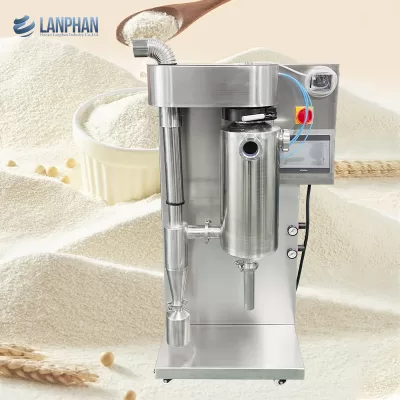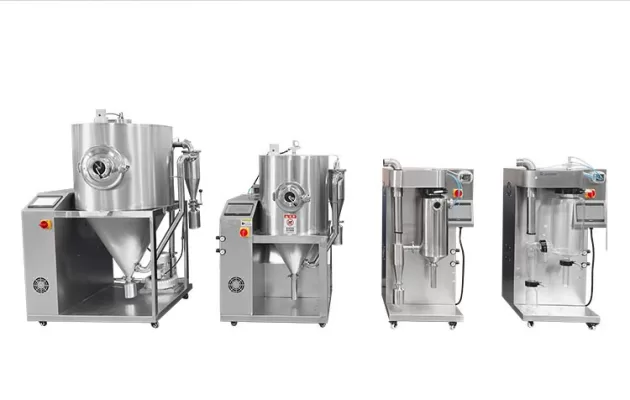Introduction of spray dryer:
Spray dryer is a drying equipment widely used to convert liquid materials into powder or granular form. Spray dryers include compressed air spray dryers, rotating disk spray dryers, pressure spray dryers, air flow spray dryers, two-fluid spray dryers, etc.

Advantages of spray dryer:
Fast drying speed: The spray dryer can efficiently convert liquid materials into powder or granules in a short time.
Controllable particle size: This process can precisely control the particle size and shape of the final product by adjusting parameters such as spray speed and temperature.
Versatility for a variety of materials: Spray dryers are suitable for a wide range of materials, including solutions, suspensions and emulsions.
Continuous production capabilities: They are ideally suited for continuous production processes and help improve overall efficiency.
Easy to store and transport: Spray-dried products are usually in powder or granular form and are easy to store, transport and use.
Precise control: Parameters such as feed speed, temperature and air flow can be fine-tuned to provide meticulous control over the drying process.
Suitable for heat-sensitive materials: Although there are some temperature sensitivity issues, spray dryers generally operate at lower temperatures than other drying methods, reducing the impact on heat-sensitive materials.
Highly customizable: Spray dryers can be designed and tuned to effectively meet specific process and product requirements.
Disadvantages of spray dryers:
High energy consumption: Spray dryers generally require a lot of energy, especially to produce the hot air required for the process.
High equipment and maintenance costs: Some spray dryers, especially those with advanced features, can involve high initial investment and ongoing maintenance costs.
Effects on heat-sensitive materials: High-temperature drying processes may adversely affect the quality of heat-sensitive materials.
Possibility of particle agglomeration: Wet particles may re-agglomerate during the drying process, leading to problems such as particle agglomeration.
High operating and maintenance requirements: Some spray dryers may require complex operating and maintenance procedures that require skilled personnel to operate.
Dust Generation: The spray drying process generates dust, requiring additional dust control systems to prevent adverse effects on the working environment and product quality.
Possible noise: Some spray dryers may produce operating noise, so steps need to be taken to mitigate the impact on the working environment.

Spray Dryer Working Principle
A spray dryer is a commonly used drying device to transform liquid materials into powder or granular form. Its working principle can be broken down
Spray Dryer Application
Spray dryers find extensive applications in various industrial sectors due to their efficiency, controllability, and uniformity in producing powders. Here are some key application areas
From Liquid to Powder: The Art of Spray Drying
A spray dryer is an industrial apparatus used for transforming liquid materials into powder or granular form, and its operational principle involves atomizing the liquid
What is a spray dryer
Facebook Youtube Instagram Quotation Spray Dryer Description Spray dryer is a device that can complete drying and granulation at the same time. According to the
How does a Spray Dryer Work?
As one of the types of continuous atmospheric dryer, it can complete drying and granulation simultaneously. According to its technological requirements, the pressure, flow and
What is Spray Drying in Pharmaceutical Industry?
For a great number of medicines, drying is an indispensable process, which has a good effect on the efficacy of medicines. And spray drying technology
